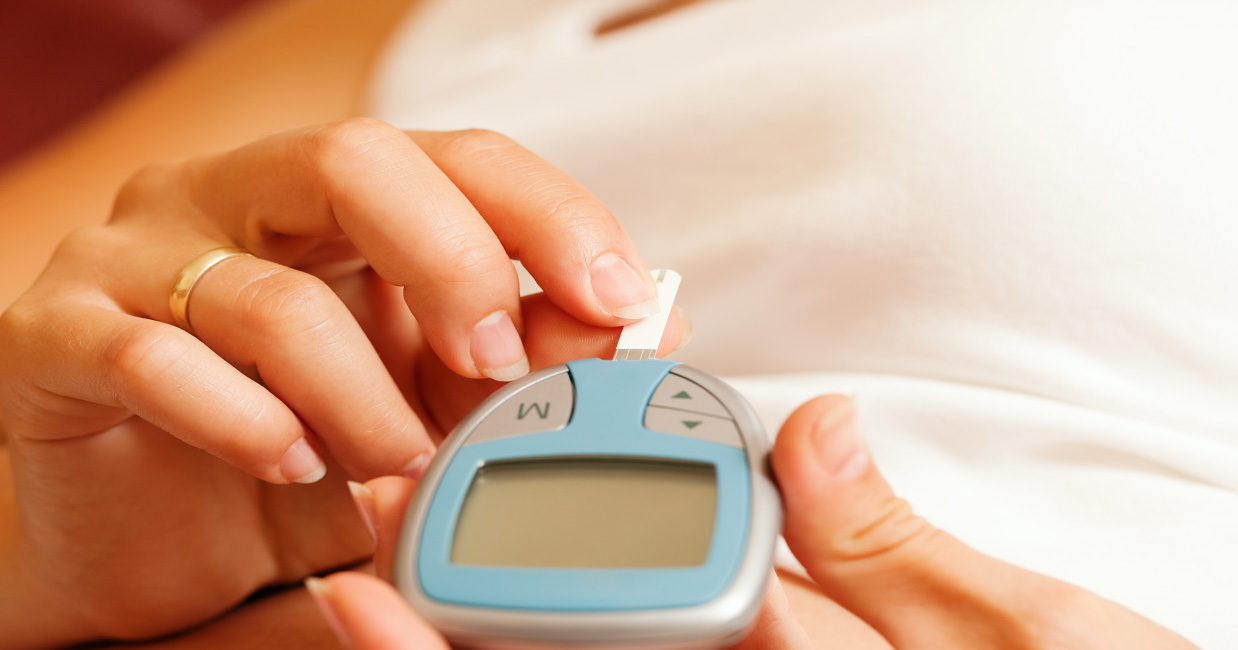08 Oct 2018

Pregnancy is an extraordinary physiological phenomenon in which the body of the woman undergoes many changes.
The nine months of gestation are the moment of metamorphosis of the baby but also of the future mother and some problems may arise during this period. They are due to the hormonal upheaval and weakness of the pregnant woman's body.
A pregnant woman must regularly visit her gynecologist for ultrasound monitoring of the fetus, examinations and blood and urine tests. One of the problems that a pregnant woman may face is gestational diabetes. It occurs when blood sugar (blood sugar level) is high.
Causes and symptoms
There are cases of gestational diabetes in women who have diabetes before pregnancy, but their diabetes has not been detected. A blood glucose test is performed for pregnant women in early pregnancy for early management.
Risk factors include obesity, glucose intolerance or 'prediabetes', family history, long-term corticosteroid use, problems with previous pregnancies such as hypertension and repeated urinary tract infections.
In the majority of cases, gestational diabetes is asymptomatic and it is silent.
In a few cases, a pregnant woman may experience symptoms such as intense thirst, heavy urination, rapid weight loss or gain, and unusual fatigue.
Consequences
The mother and her child are at risk with gestational diabetes.
For the child: when the birth weight exceeds four kilograms (macrosomia).
The newborn has jaundice, hypoglycemia and respiratory distress. It is possible to develop type 2 diabetes that can accompany him to adulthood.
In severe cases, there is the risk in utero mortality.
For the mother: she is exposed to spontaneous abortions, urinary infections, high blood pressure with edema. She is also exposed to premature labor.
A few weeks after delivery, in 90% of cases, gestational diabetes disappears. But the risk of diabetes (type 1 or type 2) over several months or even years, exists.
Follow-up during pregnancy
A pregnant woman with gestational diabetes must be followed by a nutritionist or dietician to prescribe an adequate diet to reduce glucose intake and control weight. A healthy lifestyle must be followed.
Antidiabetic drugs are contraindicated in pregnancy. However, insulin may be prescribed to a pregnant woman when the change in lifestyle is insufficient.
Morphological ultrasounds for the fetus and controlling the quantity and quality of the amniotic fluid is mandatory. Close and careful monitoring prevents the mother and child from complications.
Postpartum Follow-up
A pregnant woman with gestational diabetes is at risk of being diabetic for life. After delivery, she must continue her dietary-hygienic measures, monitor her blood sugar and be followed by an endocrinologist.
For such pregnancies, tests should be done periodically and especially at the beginning for a rigorous medical treatment and as well as adjusting to a suitable diet.
Gestational diabetes presents risks for the mother and the child. Screening tests can detect it, but prevention is better than trying to cure. Healthy eating and pre-pregnancy physical activity are the best avoidance methods.
A pregnant woman with gestational diabetes can live a fulfilling pregnancy if she consults her doctors regularly, applies their prescriptions and follows the advice of her nutritionist or dietician to improve her lifestyle.




